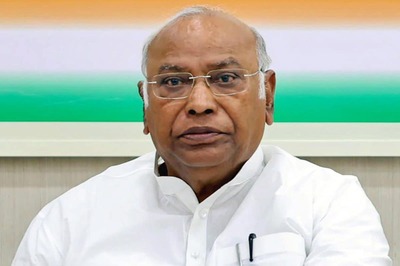
views
Bangalore/Seoul: US-based Seagate Technology's $1.4 billion acquisition of Samsung Electronics Co's loss-making hard disk drive (HDD) business pits it head-to-head with Western Digital Corp in an industry that has been dogged by price wars.
The sector is battling persistent sales growth declines and faces a longer-term threat from wireless tablet devices such as Apple's iPad that use more power-efficient flash, or solid state, drives (SSD).
However, Seagate Chief Financial Officer Patrick O'Malley downplayed those concerns, saying increasing use of data would drive demand for storage.
"We look at tablets as a good thing as they will spur data-rich consumption, which is certainly good for storage and HDD storage," he told Reuters by telephone.
The rising popularity of tablets is expected to drive demand for external drives and for so-called 'cloud' storage - or online data storage - helping companies like Seagate.
"SSD business is primarily in the enterprise space. Today, it is still a small percentage, but longer term it could be 5-10 percent of the total enterprise market," O'Malley said.
"Mainframe enterprises - the Yahoos and Googles of the world - have a lot of storage needs."
Both Seagate and Western Digital have been struggling to adapt to a future where fewer consumers have laptops and many view flash drive as the future of the disk drive industry.
The deal will give Seagate access to Samsung's NAND-type flash chips for its solid state drive products.
It comes just a month after Western Digital said it would buy the HDD unit of Hitachi Ltd -- a known price aggressor -- for $4.3 billion.
The acquisition will increase Seagate's market share to 40 percent, while Western Digital and Hitachi combined will have around half the market, Rodman and Renshaw's Ashok Kumar said.
"Hard disk drive is a commodity business. It's very hard to make money if rivals try to undercut each other," said Wedbush Securities analyst Kaushik Roy, noting there should be fewer price wars with only three players left standing.
Toshiba Corp, which bought Fujitsu's HDD unit in 2009, will have around a 10 percent market share.
Seagate had sales last year of $11.4 billion, while Western Digital posted 2010 revenue of $9.85 billion.
For Samsung, the world's largest technology firm by revenue,
exiting the cut-rate HDD industry will allow it to focus on its bread-and-butter memory chip business.
After the deal, Samsung will supply NAND-type flash chips to Seagate, while it will source Seagate HDD for PCs, laptops and consumer electronics products. Seagate will also get access to Samsung's customer base across China and Southeast Asia.
"We are not huge consumers of NAND right now, which has somewhat restricted our access to that (SSD) market because we don't have key supply. Now we have access to technology and supply," O'Malley said.
Western Digital is also looking to reap the benefits of Hitachi's partnership with Intel Corp that allows it access to the chipmaker's NAND flash technology.
"Seagate and Western Digital were late in the SSD space, but they will gain a lot of market share as these guys have scale, relationships and the distribution channels," Roy said.
Analysts expect the entry of Seagate and Western Digital to create headwinds for smaller existing flash chip makers such as STEC Inc and Ocz Technology Group Inc.
Solid-state or flash market is currently dominated by Intel, Micron, Samsung and STEC.
DEAL DETAILS
Samsung will receive 45.2 million Seagate shares - about 9.6 percent of the company - worth $687.5 million and the rest will be paid in cash. With the deal, Samsung will become Seagate's second-largest shareholder.
Seagate expects the deal to "meaningfully" add to its earnings per share and cash flow in the first year, and said it plans no material restructuring costs.
Morgan Stanley was financial adviser to Seagate, while Allen & Co was financial adviser to Samsung and Paul, Hastings, Janofsky & Walker was its legal adviser.
Separately, Seagate posted third-quarter profit below market expectations on lower hard-drive shipments, and forecast a fourth-quarter profit below estimates.
The sale should give South Korean giant Samsung more firepower for acquisitions and expansion into new business areas such as healthcare and green energy.
Seagate shares last traded down 1.7 per cent at $17.53 on Tuesday on Nasdaq.




















Comments
0 comment